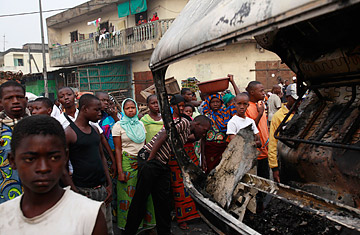
Residents stand near the charred remains of a truck in the Abobo neighborhood of Abidjan, an opposition stronghold in Ivory Coast, on Jan. 13, 2011
Back in the 1970s, the Golf Hotel was the epicenter of glamour in the "Paris of West Africa," as Ivory Coast's then capital, Abidjan, was known. Today the hotel has become the gilded cage in which the man widely believed to have won the country's presidential election is under siege by the incumbent.
In December, the country's Independent Electoral Commission declared Alassane Ouattara the winner of the presidential poll. But while most of the world accepted that result, incumbent Laurent Gbagbo has refused to yield, and ordered the army to encircle his rival at his campaign headquarters in the Golf Hotel. Some 800 U.N. peacekeeping troops living in tents in the hotel's lagoon-facing, landscaped gardens are acting as a buffer between the two camps.
Living with the President-elect is an entourage of almost 1,000 people, including his Cabinet, ministerial aides, troops and other supporters.
A new face is warmly received in the hotel, nicknamed the "Golf Republic." People are quick to help. Stomach hurting? The doctor is on the ground floor, second left. Hungry? There's free food in the basement canteen; fish or steak (flown in by U.N. helicopters) is on the menu at the bar. Want to catch a glimpse of Ouattara? His office is down that corridor.
"[Pro-Gbagbo] soldiers came after me when I managed to escape," says one resident, who has spent five weeks here. "So I came back. I brought an electric razor with me, and now I charge to cut people's hair."
The sense of comradeship is real, but still, a presidential aide jokes when she announces that the U.N. helicopter — our only link to the outside world — is delayed: "At least you're psychologically prepared for the wait!" During my eight hours on the hotel's plush grounds, I conducted a brief interview with Ouattara:
TIME: You have been living under siege for nearly two months. Do you feel trapped?
Ouattara: No, because I love my country and I love my people. If I were someone a bit excitable and unbalanced, I would use force myself. But I believe in the power of peace, and I believe Mr. Gbagbo will leave soon.
The sustained pro-Gbagbo state media campaign against you is causing many of your supporters to lose hope. Do you have a solution to that?
Yes, I will be launching my own TV station, starting from Monday onward.
If power remains concentrated in the army, do you worry you risk remaining forgotten in this hotel, or perhaps risk being in a similar position to that of Aung San Suu Kyi [who spent two decades under house arrest after the Burmese military annulled the results of the 1990 election won by her party]?
Ten years' [incarceration] is too long! I am not worried about that happening here. In the case of Burma, Aung San Suu Kyi didn't have internationally recognized ambassadors in the U.S. and so forth, which I do. [The U.S. and other countries have recognized Ouattara's envoys as official representatives of Ivory Coast.]
What is the solution to this post-electoral crisis?
We political leaders all signed peace accords [in 2007, to end the civil war that had divided the country into a southern half run by Gbagbo and a northern half run by the rebel New Forces army] agreeing that the elections would be certified by the U.N. We agreed that Blaise Compaoré, [President of neighboring Burkina Faso] would arbitrate the results. His results matched those given by the electoral commission, giving me a 54% win. That result was certified by the United Nations.
Gbagbo and his cronies are behaving like gangsters. I think it has now reached the point that the Economic Community of West African States [Ecowas] should go ahead with its publicly stated position: that unless Gbagbo leaves office, other measures, including force, will be used.
Ecowas has so far eschewed even applying financial sanctions. What makes you sure it will intervene?
Up until a few days ago, there was still a possibility of a peaceful solution. Then Gbagbo's camp promised to lift the blockade — the second time — and didn't honor that. I wanted to give peace and dialogue a chance. Now that that's failed, we must consider other methods.
When and how would you recommend military intervention by Ecowas?
They would need logistical support from other countries in the European Union and U.S. I hope we will know when by the end of this month, because it will make two months since I've been elected.
Do you feel you are relying too much on the international community for a solution?
Domestically, I believe it's clear that the army is divided over this situation. We believe only 10% are behind Gbagbo. The real problem is that Gbagbo has stashed a huge supply of arms. But there could be an internal solution. At some stage, the majority of the army will move, I think, against Mr. Gbagbo. Force should be used against him, whether internally or externally.
